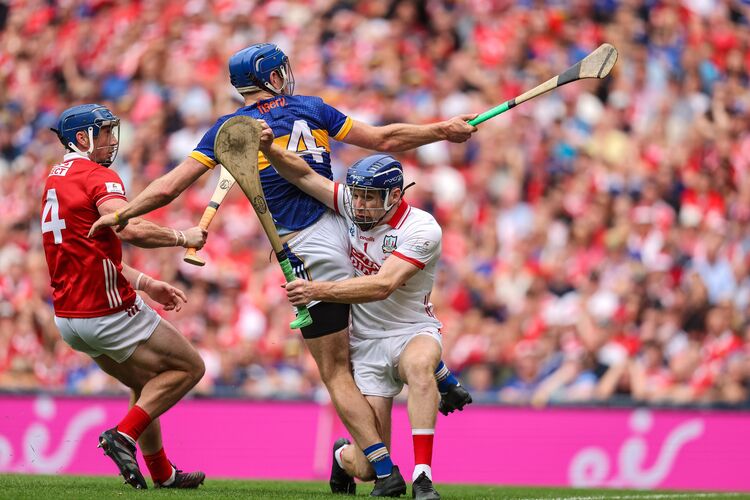We Banjo 3. PHOTO BY DAVID NORTON
By Colleen Taylor
Nowadays, if you want to hear good bluegrass, you’ll have to look east across the Atlantic, as well as south to the Mississippi. Galway’s “Celtgrass” pioneers We Banjo 3 are a delightful diasporic paradox, known for their unique mix of traditional Irish and Americana bluegrass. Others in this music sector call it “Eirecana,” but the whimsy and vigor implied in the term “Celtgrass” is reserved for We Banjo 3 alone. When you’ve pioneered your own genre fusion, you’ve officially made it, and We Banjo 3 is using that renown to move onto a new venture: an entirely original, and decidedly less Irish album. Not without irony, these four roots musicians have left their own roots behind and gone full Americana for their recently-released fifth album, “Haven.”
We Banjo 3, is, as it turns out, full of irony, starting with the fact that they are not three, but four members, two sets of brothers: Enda Scahill (banjo) and Fergal Scahill (fiddle and percussion) make up one half, while David Howley (guitar and lead vocals) and his brother Martin Howley (mandolin, banjo) make up the other half. Each of the bandmates has their own reputation outside of We Banjo 3 in the traditional music world, but the Americana influences are what set them all apart. For the past seven years, they’ve earned the accolades of fellow traditional Irish and Americana musicians, technique-based competitions like the All Ireland, commercial venues like RTE, music award shows like Songlines and Trad album of the year—not to mention multiple glowing reviews from the Irish Times, and even the applause of President Obama himself when they played Capitol Hill. I see We Banjo 3 as filling a gap that Solas, after 20 spectacular years, left vacant—expertise musical talent that honors tradition on both sides of the Atlantic.
The four musicians are relishing the moment of their fifth studio album, “Haven,” which signifies a new stage for the band in that all eleven tracks are originals. Not long ago, the four band members each brought a set of their own tunes to a gathering spot in Carraroe, Connemara, where they transformed a number of disparate compositions into a unified, cohesive collection of original tunes. The arrangements exude an unmistakable modernity, but at the same time, many of these songs sound as if they could have easily been written two centuries ago and updated into We Banjo 3’s 2018 adaptations. To my ears, that’s the greatest feat a roots or folk band can achieve: to produce something entirely new that also blends in seamlessly with the timeline of tradition. Still, there is plenty of room for We Banjo 3 to grow into a new modern identity. For one, I would be excited to see a woman featured on their next album, adding an even greater dynamic to their vocals and style.
The album’s creative birthplace in the Gaeltacht ironically contrasts the band’s intention with the album—that is, to shirk the title of “traditional Irish.” Indeed, “Haven” extends beyond the expected blend of American folk and traditional Irish to embrace the American influences more fully, such as brass instruments like saxophone and a featured bass on nearly every track. The narrative and ambiance are more consciously American as well—there’s a Wild West or Deep South feel to the rhythms in “Marry Me Monday” and the country-sounding song “Don’t Let Me Down.” David Howley’s vocals adopt American drawl inflections so that you’d never know he had an Irish accent. Moreover, the title track, which is arguably the best vocal on the album, is an expert embrace of eclectic influences—brass, soul, American country, and of course the quintessential bluegrass banjos. It somehow highlights all these varied sounds while also being a catchy, sing-along chorus.
As much as I love the ironic image of early 20th century American roots music pouring out of a Connemara cottage, I can’t agree that “Haven” entirely uproots We Banjo 3 into reverse-diaspora. Galway can still be heard in subtleties of these new original tracks, and that’s what brings them to life. “Dawn Breaks,” for instance, which is my favorite track on the album, begins just like a Lunasa set (fitting, given Lunasa’s Trevor Hutchinson joins in on bass in this track) with a lively pair of Irish jigs, then easily dances off into a bluegrass tune, takes dramatic pause and finally, swiftly swings back to a reel. This quick back and forth across the Atlantic is where the genius of We Banjo 3’s vision lies, where bluegrass and trad literally come head to head and do-si-do. To say that the album isn’t trad—although a bold testament to the band’s new venture—potentially does “Haven” a disservice. The band’s Irish musical roots attest to complexity of the album’s instrumental style and point to its most vivid loci of energy. After all, an Irish background is what makes the We Banjo 3’s approach to Americana noteworthy; the outside perspective, it would seem, can more clearly see the genre’s creative potential. The feel-good song “Light in the Sky,” for example, is crisp, detailed, and jubilant, performed with the vision and naivete of a tourist, who excitedly zeroes in on every tiny feature of his new surroundings. Although “Haven” sounds less Irish and decidedly more grass and roots, its spirit ironically mirrors the awestruck Irish émigré, newly arrived in America.
But the most profound irony of We Banjo 3 is this: to the American listener, these four Irish musicians re-familiarize us with American history, and consequently, patriotism. One cannot help but feel a fondness for American culture when these four Irish men play their own original Americana music. “Haven,” more so than any of their previous albums, escapes into a better, if imaginary, America. There is history, hopefulness, nostalgia and unadulterated mirth in these tracks. “Sugar House” places you squarely in a barn dance, with light, playful instrumentation. This is something of which the two sets of brothers are particularly proud; they are happy their shows can provide fans escape from what they call an increasingly “maddening world.”
Having just finished my fourth listen of the album, however, I can’t help but wonder if “Haven”—as heavenly as it is—comprises escapism. We Banjo 3’s music is so alive, so active and vivid, that it plants you squarely, buoyantly in the present moment. Perhaps their concerts let us escape the madness of our present world and time, politically-speaking, but they also remind us that the good parts of the past are never past, only rejuvenated through culture and creativity. This music places us in our moment while also recalling tradition, and thus assures us there is plenty of good remaining in this world—good community, good fellow feeling, good energy, and plenty of good tunes.







